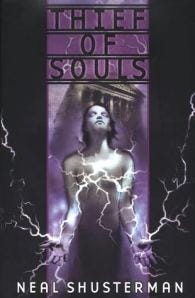Thief of Souls By Neal Shusterman

Following Scorpion Shards (which was by far the least biased and more entertaining of the two) the kids have grown, meta-physically and otherwise. Their powers have developed in a different way than the first novel showed due to not having their "leaches". The development of the characters has made some of their dynamic change the relationships between them and we learn the origins of their powers are closer to home than we think. The second book's villain is beginning to remind me of those in The Lightning Thief series, and while we get a taste of a smattering of folk-lore, I wouldn't focus too much on the accuracy if you're in it for the adventurous drama.
Plenty interesting, with the exception of being more gruesome. And since I only reached up to Chapter 22 of this book I'll start from the beginning. It leaves off pretty much where the second novel ended, but what becomes glaringly clear is there are parts which show Shusterman's short-comings in the terminology which society and teenagers would normally use when talking about gay couples and the inner-workings of a relationship or friendship. To this reader, he sounds like he needs to start reading some gay literature.
Maybe then he might be able to sound more natural having his teen-age characters broach the subject. Until then, we must suffer through those moments and his conspicuous need to throw in the word "queer" to describe what Shusterman thinks is an overtly gay movement perhaps; Or referring to one of his teenaged character's as a faggot through one of his antagonists which I now realize might come from a strictly ignorant Christian "faith" upbringing; Because since this point, I've started to notice repetitive statements supporting my claims the more I read and it also supporting Okoya's character being his "devil". At least Ian Fleming has more entertaining flare when it comes to his sexist comments which for some reason, doesn't hinder the skew of the reality he imagines. Despite those issues, he does let the protagonists have the final laugh.
As for the author, Shusterman has a way of making a violent act a bit more detestable which I still find surprising, even though I'm not one to shy away from extreme fictional situations. I believe this will be the first and last series I read from this author and he's certainly not doing anything for g.l.b.t. fiction; He's quickly become one of those writer's I can't bring myself to like due to their narrow-minded views. I now understand why Heinlein is a fan of his.
